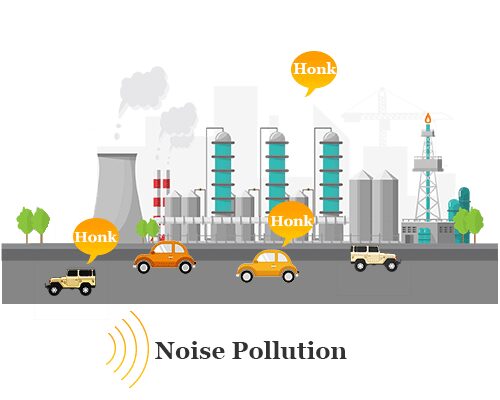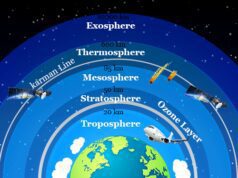Noise (Sound) Pollution
Noise pollution or sound pollution is unwanted or excessive sound that can have harmful effects on human health, wildlife, and our environment. The source of noise is the machines in factories, transport, and propagation systems. Railway trains, motor horns, and loud music are the main sources of sound pollution in residential areas. The sounds of high decibels create harmful effects like disturbing blood pressure and affecting the nervous system. Textile mills, printing presses, engineering factories, and high-speed machines create more and more noise to disturb the living of human beings.

Sources of Noise
The increasing speed and length of railway trains can increase the volume of noise produced by them during their journey.
The automobile revolution in urban cities is a big source of noise pollution. Increasing cars, bikes, and jams in congested areas impacts the lives of urban people. Agricultural Machines like tractors, thrashers, harvesters, tube wells, and powered tillers are other sources of sound pollution. These types of machinery are highly noisy and impact the lives of people.
Loudspeakers (95 decibels) in religious functions and commercial advertising, airplanes (100 decibels), motor horns (110 decibels), rockets (170 decibels), sirens (150 decibels), motorcycles (110 decibels), etc are the other sources of noise pollution that have harmful effects on human life.
Effects of Noise Pollution
- Like soil pollution and water pollution, noise pollution also affects millions of people on a daily basis. Excessive noise disturbs blood pressure and affects the digestive system.
- Prolonged exposure to noise is harmful to the nervous system and affects the memory of human beings.
- Noise leads to the gradual loss of the learning capacity of human beings.
- Excessive noise produces psychological effects on human beings. It increases diastolic blood pressure, irritability, neuromuscular tension, etc.
- It disturbs the sleep, rest, and working efficiency of people.
- A sound of high decibels (> 160 decibels) creates headaches.
- Sound affects pregnant mothers and increases the rate of their heart beating. It has adverse effects on the newborn child.
- Sound pollution causes confusion in color perception. Therefore, it affects the field of vision.
- Noise pollution may increase violence and may cause a state of depression and tiredness.
Solution of Noise Pollution
- People who work or live around loud sounds can protect their ears with hearing protection like earplugs or muffs.
- Roadway noise can be controlled by better design of roads. It also reduces by limitation of vehicle speeds and heavy vehicles, by using traffic control to reduce breaking and acceleration.
- Urban planning is also an important factor in reducing sound pollution.
- Quieter jet engines can be used to control noise pollution caused by aircraft. The altering flight path is beneficial for residents who live near the airport.








